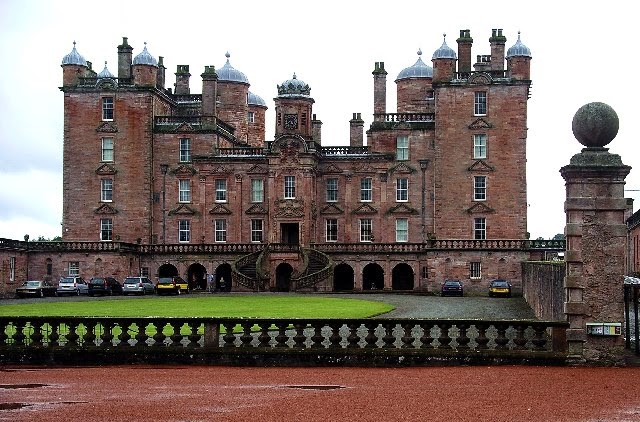By: Simon Brooke :: 9 December 2014

I've written before about an exponential land tax. Rather often in fact... Here I want to give a clear account of how it would work, with a computer program (in Clojure) so that you can fiddle with it yourself.
The code on this page is live: you can edit it. I recommend that (at least at first) you change only the constant and the exponent.
So, the core of the idea is that you pay a small amount on your first hectare of land, a little bit more on your next hectare, a little bit more on your next, and so on. There are two key numbers in this idea: the constant, which is the amount of money you pay on the first hectare, and the exponent, which is the power the number of hectares we've counted so far is raised to to calculate the little bit more. So what you pay in tax is Σ1..n(cn)e, where n is the number of hectares you own.
Expressed as a clojure function, that's:
(defn expt [x n] (reduce * (repeat n x)))
(defn summed-exponential-series
"Sum an exponential series from 1 to limit.
`constant`: the constant by which integers in the range are multiplied;
`exponent`: the exponent to which they are raised;
`limit`: the limit of the range to be summed."
[constant exponent limit]
(reduce
+
(map
#(expt
(* constant %)
exponent)
(range 1 limit))))
We now need to create a table of sizes of interesting land-holdings as Clojure code (areas in hectares):
(def holding-sizes
[["Average croft" 5]
["Average farm" 101]
["Glasgow Airport" 300]
["Edinburgh Airport" 400]
["Grangemouth Refinery" 700]
["Countess of Sutherland" 33000]
["Earl of Seafield" 40000]
["Captain Alwynn Farquharson" 51800]
["Duke of Westminster" 54000]
["Duke of Atholl" 58700]
["Duke of Buccleuch" 109000]])
and finally a little function to map the first function over the table:
(defn sample-taxes
"Prints sample taxable amounts for a table of holdings."
[constant exponent holdings]
(map
#(let [tax (summed-exponential-series constant exponent (second %))]
(print (str (first %)
" (Area "
(nth % 1)
" Ha) Tax: £"
tax
"; per Ha: £"
(/ tax (nth % 1))
"\n")))
holdings))
We can now ask, given a constant and an exponent, how much tax each of these holdings would pay.
For example, if we start with a modest £1 of tax on the first hectare, and set an exponent of only 1.05, we get this pattern:
| Constant | £ 1.00 | Exponent | 1.050000 |
|---|---|---|---|
| Holding | Holding Size (Ha) | Annual Tax due | Tax per Ha |
| Average croft | 5 | £ 10.53 | £ 2.11 |
| Average farm | 101 | £ 6,204.08 | £ 61.43 |
| Glasgow Airport | 300 | £ 58,191.38 | £ 193.97 |
| Edinburgh Airport | 400 | £ 105,040.07 | £ 262.60 |
| Grangemouth Refinery | 700 | £ 331,177.47 | £ 473.11 |
| Thousand hectares | 1,000 | £ 688,336.48 | £ 688.34 |
| Ten thousand hectares | 10,000 | £ 77,303,938.64 | £ 7,730.39 |
| Countess of Sutherland | 33,000 | £ 893,688,616.49 | £ 27,081.47 |
| Earl of Seafield | 40,000 | £ 1,325,738,877.59 | £ 33,143.47 |
| Captain Alwynn Farquharson | 51,800 | £ 2,252,234,219.56 | £ 43,479.43 |
| Duke of Westminster | 54,000 | £ 2,452,703,794.50 | £ 45,420.44 |
| Duke of Atholl | 58,700 | £ 2,910,359,665.77 | £ 49,580.23 |
| Duke of Buccleuch | 109,000 | £ 10,350,620,262.71 | £ 94,959.82 |
So ordinary people would pay trivial amounts; farmers would pay a bit more than I really want them to; the airports and the refinery, amounts which are perfectly affordable to them... and the aristocracy would have either to abandon most of their lands or be bankrupted utterly (yes, that is ten billion pounds the Duke of Buccleuch would owe, each year).
The point of offering you this as code that you can fiddle with is that by changing the constant and the exponent you can change the pattern of charges. The curve isn't quite right here; I feel that the levy on farmers is relatively speaking too high, on the refinery perhaps a little low. Tweaking the constant down and the exponent up changes the picture.
(def constant 1.0) ;; the amount in pounds sterling due on the first hectare — you may change this
(def exponent 1.05) ;; the exponent by which the additional tax on each subsequent hectare is increased — you may change this
(sample-taxes constant exponent holding-sizes)
Obviously, an exponential land tax would not generate very much revenue, since most people wouldn't pay very much at all and most of the few who would be assessed for large amounts would have to abandon their land immediately. But the point is not to generate revenue, the point is to redistribute land; and it would do that exceedingly effectively.
« I want the whole of the moon | | Quarter of a million crofts »

